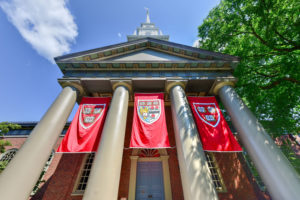Closing Time: Harvard’s Ban on Single-Sex Social Clubs

Absolute bans rarely fix problems. The ratification of the Eighteenth Amendment and the following thirteen years of Prohibition, for example, didn’t end drinking but instead brought about speakeasies and a black market for alcohol. In a similar vein, Harvard University’s recent ban on all sex-segregated social clubs, including fraternities, sororities, and the exclusive all-male “final clubs,” is being called ineffective and more of a symbolic gesture than a meaningful regulation.
A faculty committee released a twenty-two-page report early this month that forbids entering freshmen from joining sex-segregated social clubs beginning September 2018. The committee’s goal is to completely phase out such clubs by May 2022. The report stresses the legacy of discrimination, sexism, and elitism associated with these clubs and how they are contrary to the “long-held and oft expressed view that student body diversity is essential to Harvard College’s pedagogical objectives and institutional mission.”
It’s no secret that fraternities, sororities, and exclusive societies like final clubs can be toxic to young college students. Across the country these organizations are often the sites of deathly hazing, blatant and institutional racism, and sexual assault. They create hierarchies and breed exclusivity. They reflect the traditional status quo and perpetuate social inequalities. And yet, they are also centers of support and connection for stressed out students trying to make it through the school year. They offer a frivolous relief from the high demands of coursework and the constant competition in classrooms. They build life-long friendships and help students navigate the challenges of college.
Harvard’s banning of single-sex social clubs sacrifices individual and community empowerment for a shallow, Band-Aid provision that doesn’t offer any specifics on how to address the faculty’s targeted concerns. Steven Pinker, 2006 Humanist of the Year and professor in the Department of Psychology at Harvard, expressed his objection to the ban in his comments to the faculty committee, which he also shared with theHumanist.com. Pinker indicts the ban for being superficial and ineffective, explaining that, “Policies that restrict student’s freedoms should not be symbolic statements of values; they should be means to justifiable ends.” He criticizes the ambiguity of the faculty committee’s recommendation, citing that it doesn’t target any “illegal or objectionable behavior…Nor by any stretch of the imagination could it be seen as an effective, rationally justified, evidence-based policy for reducing sexual assault.”
Pinker’s critique echoes the concerns cited by Harvard sorority women and female final club members who believe the ban will push the bad behavior and sexual assault that the faculty committee is targeting within fraternities and male final clubs further underground, making these groups more difficult to monitor and harder to hold accountable. By the opposition’s account, this ban is less of a practical solution and more of a symbolic gesture by the university to save face.
In an op-ed written for Harvard’s newspaper, The Harvard Crimson, second-year law students and members of the Gender Violence Legal Policy Workshop at Harvard Law School spoke out against the faculty’s initial sanctions on sex-segregated organizations. In their statement, the law students maintain that, “Harvard must take affirmative steps to ensure students’ safety beyond implementing sanctions and hoping this problem goes away.” They go on to recommend that annual sexual assault trainings be formalized across all houses and that the implementation and enforcement of these trainings become a university priority. Finally, they state that single-sex organizations should be allowed to stay a part of the campus culture so long as they show “a sufficient commitment to gender equality, inclusion, respect, and prevention of sexual violence.”
To ban sex-segregated social organizations would not only be ineffective in addressing student and faculty concerns alike, but also stands at odds with the pillars of a university education (and humanist principles) that promotes critical thinking and dissension. As Pinker points out, the faculty committee’s recommendations “run afoul of many of the principles on which liberal education and liberal democracy are based.” By dictating a ban on student organizations, the university is imposing a narrow ideology rather than hosting an open discussion to bring about effective solutions.
